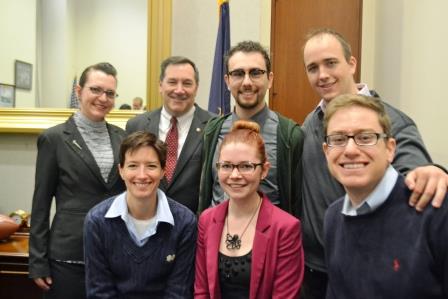This year, for the first time, MSPL students are going to participate in a mock Markman hearing. What is a Markman hearing, you ask?
When a patent is litigated (think Apple v. Samsung [smart phones], Association of Molecular Pathologists v. Myriad [breast cancer genes and diagnostics]), one of the important steps of the pre-trial process is the Markman Hearing. This hearing is named for a case from 1996 in which the Supreme Court decided that a patent’s claim language is a matter of law (to be decided by a judge) instead of a matter of fact (to be decided by a jury). The outcome of that case is that now, before a patent infringement case goes to a jury, a judge will “construe” the claims via a Markman hearing.
In the Markman, the two sides decide jointly which claim terms need to be clarified, and then each side briefs and then argues their positions before a judge. Cases can be won or lost at the Markman stage, since an unfavorable claim construction (ie, interpretation) can completely undermine one party’s legal position. In fact, many cases settle immediately after the Markman hearing.
It’s important for a patent agent to understand how litigation works, since the patents which they write may eventually be litigated. The Markman is the most direct part of that process — why did the patent agent or patent attorney choose a particular word for a claim, and what did that word mean when it was chosen?
Our students will be taking claims and terms that were litigated in the recent Apple v. Samsung case, and briefing/arguing a couple of the more interesting claim terms. Our judges will be two practicing patent litigators — Rick McCaulley from Ropes & Gray in Chicago, and Tony Dowell from Taft, Stettnius in Indianapolis. Next Friday we’ll meet to learn about Markman hearings and identify the claim terms to brief, and then the following Friday the students will present oral arguments. Check back to learn how it goes!

